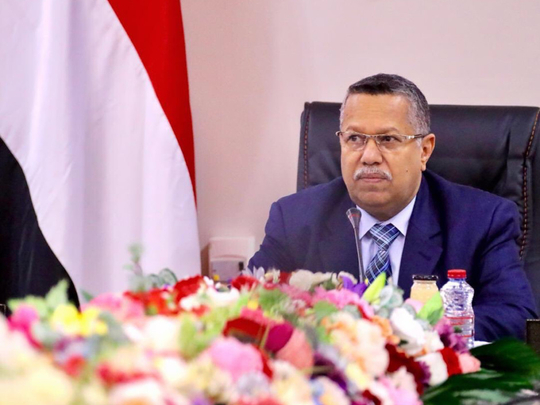
Al Mukalla: The internationally-recognised government of Yemen has announced its first budget since Iran-backed Al Houthis occupied Sana’a in late 2014.
Yemen’s prime minister, Ahmad Obeid Bin Daghar, said at a press conference in Aden that the estimated revenue for 2018 is 978.203.500 riyals( USD 1=450 riyals) and the estimated spending is 1.465.042.631 riyal with 33 per cent deficit.
The announced budget is almost half of 2014 budget that was 2.88 trillion riyals.
Bin Daghar blamed the Al Houthi’s coup and their military operations for destroying the country’s main sources of revenues for the new austerity budget.
The spending will include salaries of government and military servants in 12 provinces under government control plus funds to health offices, judiciary authorities and universities in Al Houthi territories.
Bin Daghar said that his government has stopped paying government employees inside Al Houthi-held provinces until the militants transfer revenue from these areas to the central bank in Aden.
Yemen has been gripped by a raging civil war for three years when Al Houthis stormed the capital, forcing Yemen’s president Abd Rabbo Mansour Hadi to decamp to the southern port city of Aden where he urged his neighbours to step in militarily to help him fight Al Houthis.
In March 2015, Saudi Arabia and allied Arab countries began massive aerial bombardment targeting Al Houthi military camps.
Bin Daghar said that Al Houthi military actions have halted oil crude and gas exports, the main source of revenue for the government.
“The war waged by Al Houthis have caused great destruction to infrastructure, paralyzed the economy and destroyed and looted government and private institutions.” Bin Daghar said.
Saudi Arabia has recently injected $2 billion to the central bank in Aden to save the riyal from total collapse. The riyal stood at nearly 450 to the dollar despite a decision by the central bank fixing the exchange rate against the collar at 379. Most of government’s revenue comes from selling roughly 40,000 barrels of oil daily from Masila fields in Hadramout, border crossings, seaports and airports.
In September 2016, Yemen’s president ordered relocating the central bank’s headquarter to the port city of Aden, accusing Al Houthis plundering the bank’s reserves on their military efforts. Bin Daghar believes that his government would be able to pay government salaries in all provinces without financial help from donors if Al Houthis sent revenue from Hodeida seaport and mobile and banks taxes to Aden.












